Top 5 Business Data Providers


Finding the right business data can feel like searching for a needle in a haystack.
With countless providers promising accuracy, scale, and precision, it’s easy to get lost in the noise.
The good news is: you don’t have to sort through it all on your own.
We’ve reviewed the leading players in the space and narrowed it down to five data providers worth your attention.
Each one brings something different to the table in terms of data types, use cases, and advantages.
Here’s what you need to know.
Let’s start with our solution.
Veridion is an AI-powered market intelligence platform built for procurement, risk, insurance, and sustainability teams who need clarity in a complex market.
We provide the most complete, accurate, and up-to-date company-level data available today.
Our database includes:
This spans public companies, large private firms, and over 90% of SMBs, including digital-first, unregistered, and micro-businesses that most providers overlook.
And because our database is updated every week, you can trust that your decisions are based on what’s happening now—not six months ago.
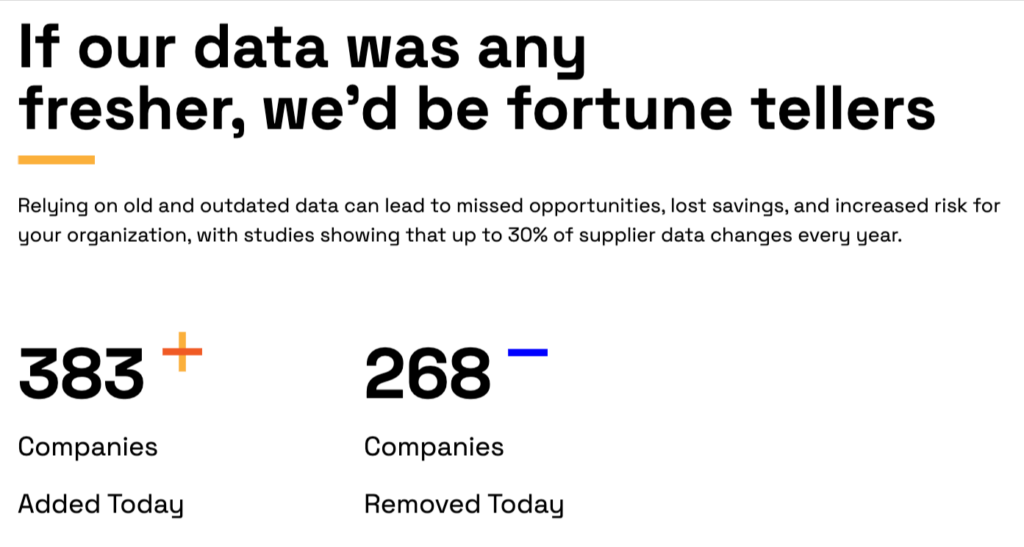
Source: Veridion
Aside from that, Veridion goes beyond just firmographics, giving you a true 360° view of a company, including:
So whether you want to map competitors, segment markets with precision, assess risks, or find a reliable supplier, Veridion equips you with the insights you need to make smarter, faster decisions.
If a company exists—big or small, private or public—Veridion will find it, giving you unmatched visibility.
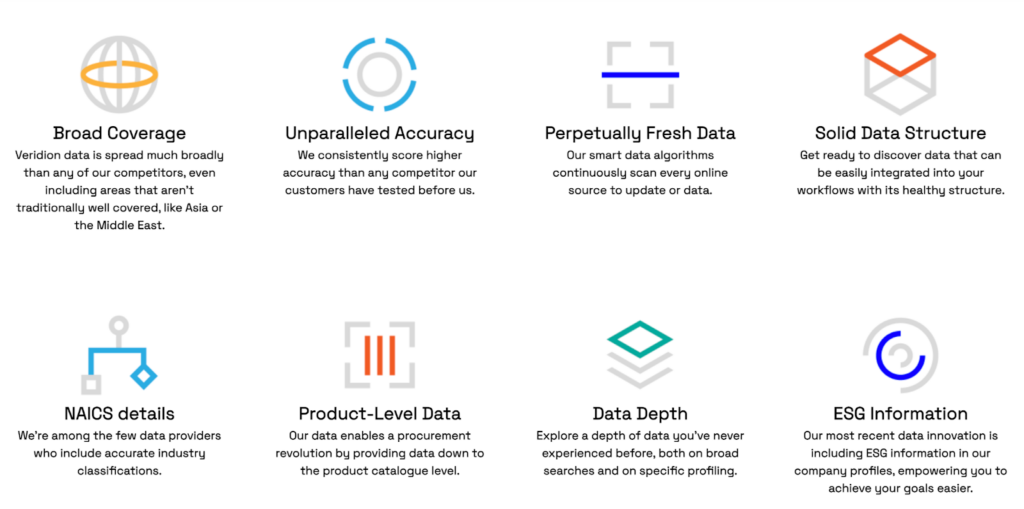
Source: Veridion
But where does all this data come from?
We’ve built an end-to-end data pipeline from scratch, which means we control every stage—from sourcing and extraction to normalization and delivery.
Our foundation is first-party data from company websites and legal registries, which we then validate using trusted third-party sources like social media, news feeds, and public filings.
Learn more about how it works here:
Source: Veridion on YouTube
Unlike many providers, we don’t depend on external vendors.
That independence gives us consistency, transparency, and traceability across every dataset.
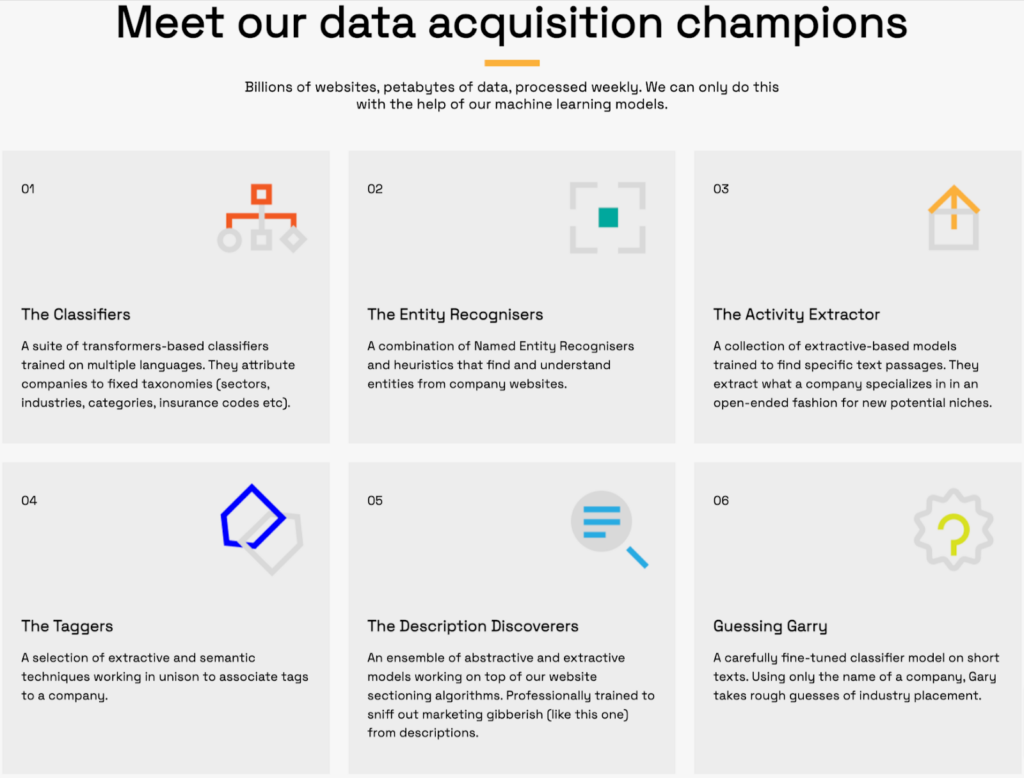
Source: Veridion
And because we own the entire pipeline, we also guarantee its security.
All our data is securely hosted in facilities across Europe and North America, fully compliant with GDPR, CCPA, and all major data privacy frameworks.
All in all, Veridion caters to all sorts of business functions, from procurement and risk to market analysis and ESG, delivering the highest quality, coverage, and depth of data.
If this sounds like what you’ve been missing, head to our website to schedule a data consultation or grab a free data sample to see the quality for yourself.
Dealfront is an AI Go-to-Market platform designed for businesses that want to win more leads.
Their database includes:
Unlike Veridion, which covers companies worldwide, Dealfront has a sharper focus on Europe, where it tracks over 34 million companies.
They also cover more than 20 million companies in the United States, but coverage outside these regions is limited.
Each Dealfront company profile is rich with detail, including:
You’ll notice that much of this overlaps with Veridion, though Dealfront doesn’t offer product-level insights, ESG data, or risk intelligence.
Where Dealfront does excel, however, is its buyer intent data.
It can identify the companies behind your website visits and reveal exactly what they are interested in.

Source: Dealfront
You’ll see when a target account visits your website, get alerts when they appear in the news, and be able to reach out when they are actively searching for or in need of your solution.
Another strong feature is ICP insights.
These help you identify which visitors match your ideal customer profile, highlight your top-performing traffic sources, and automatically organize visitors into segments so you can build a more qualified pipeline.
Learn more here:
Source: Dealfront on YouTube
Leadfeeder Tracker, a small piece of JavaScript placed on your website that identifies visits, updates every 24 hours, so your intent data is always fresh.
When it comes to data quality and security, Dealfront relies on official sources such as national trade registers and chambers of commerce, enriched with firmographics and financials.
Their data is fully compliant with the highest standards of data protection, so you can use it with confidence:

Source: Dealfront
In short, Dealfront is an excellent choice for businesses that want to strengthen their sales and marketing efforts.
It helps teams focus on high-intent accounts, engage at the right moment, and convert more efficiently, reducing wasted effort and driving consistent wins.
The only caveat is coverage:
If you need data outside Europe and the U.S., you’ll probably want to look elsewhere.
To learn more, visit the Dealfront website and request a free trial to see the solution in action.
Hunter is your all-in-one email outreach platform, built to help you find and connect with the people who matter most to your business.
Their numbers are impressive:
What makes Hunter stand out from other solutions on this list is its simplicity.
It’s built specifically for email.
So, you won’t find phone numbers, social media profiles, or financial data like with some of the other tools.
But what Hunter does, it does well.
With powerful market segmentation features, you can quickly identify qualified leads for sales or outreach based on the attributes of your ideal customers.
You can filter by:
Once you’ve found the right companies, Hunter’s Domain Search helps you uncover the right people to contact within them, surfacing publicly available email addresses in seconds.
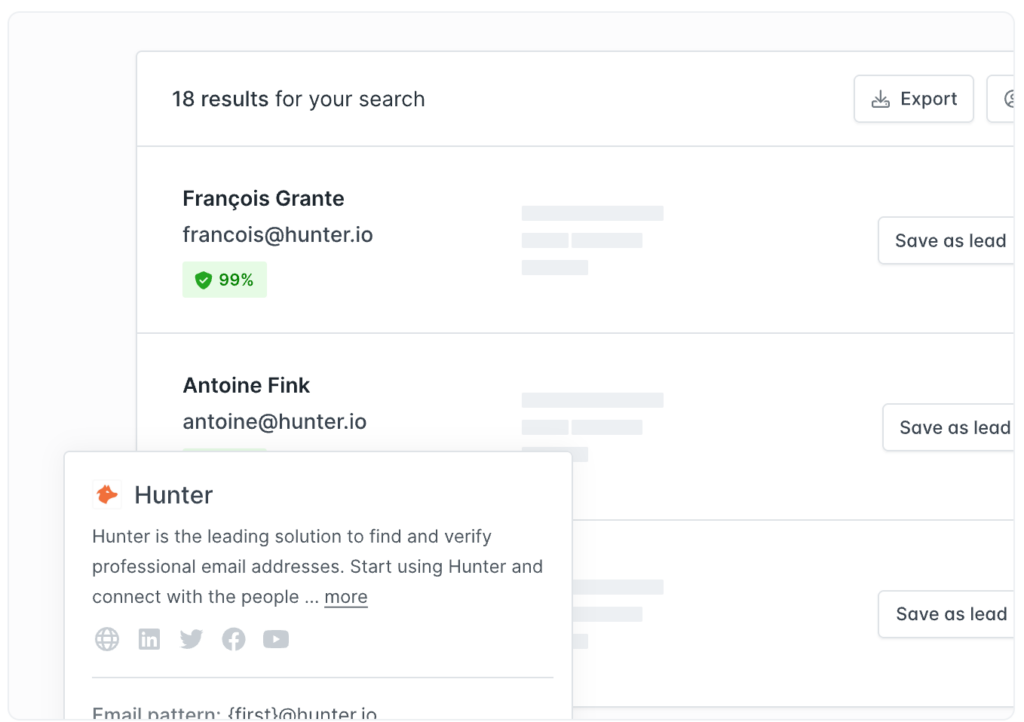
Source: Hunter.io
To ensure accuracy, Hunter also offers an Email Verifier, which validates addresses at multiple levels:
The result: clean, reliable contacts you can actually use.
Here’s where it gets interesting:
Hunter also gives you tools to act on those contacts right away.
With its built-in email campaign automation, you can connect your inbox to create, personalize, schedule, and send targeted campaigns at scale.

Source: Hunter.io
Of course, Hunter has its limitations as well.
If you’re looking for phone numbers, deep company data, or insights into products and finances, it won’t be the right fit.
Some reviews also note that coverage is lighter for startups and niche industries.
But not every team needs a complex platform.
Sometimes, you just want a reliable way to find someone’s work email and verify it before you hit send.
That’s what Hunter is all about: a lightweight, easy-to-use platform that helps sales and marketing teams reach the right people.
Whether you’re running cold outreach, updating your CRM, or just trying to connect with a decision-maker, Hunter gets you there.
It’s also fully GDPR and CCPA compliant, so you can use it without worrying about privacy or security.
If this sounds like it might be the right fit, visit their website to explore pricing or jump straight in with their completely free plan.
S&P Capital IQ Pro is a global financial database and analytics platform developed by S&P Global Market Intelligence.
It delivers a powerful suite of tools, data, and insights for professionals in finance, investment, and research.
Here’s what you get with Capital IQ Pro:
| Public company financials | 109,000+ public companies, including 49,000+ active with current financials |
| Private company data | 54M+ private companies, including 14M+ with financials |
| Estimates | 140+ metrics for 19,800+ active companies across 110+ countries |
| Ownership | 49,000+ public companies, 35,000+ institutions, 51,000+ funds, 336,000+ insiders, and 12,000+ investor activism campaigns |
| Transactions | 1.2M+ M&A deals (including 4,000+ spin-offs), 688k+ public offerings, 870k+ rounds of funding, 134k+ shelf registrations, and 99k+ buybacks |
| Sustainability insights | Climate Analytics, Environmental Analytics, ESG Scores, and Business Involvement Screens for 15k+ companies |
| Supply chain data | Proprietary research, supply chain company profiles, and country-level analysis via Panjiva |
| Financial institutions | 60k+ banks and 725k+ international bank branches with financial data tailored by size and market |
As you can see, S&P Capital IQ Pro offers broader coverage than many other solutions on this list.
Their datasets are sector-specific, data-rich, and hyper-targeted to evolving business needs.
With this platform, you can access financial and operational metrics at the asset level across key industries, including:
It may not cover every sector (like, for instance, Veridion and some other tools do), but it’s still highly relevant for financial services and capital-intensive industries.
On top of its core database, the platform comes with advanced features.
For example, Document Intelligence helps analyze global filings, IQ Newsletters deliver daily updates, and ChatIQ enables natural language queries for quick insights.
But all these advanced capabilities come with trade-offs.
Some users note that the platform has a steep learning curve and can feel complex to navigate, especially when you compare it to other solutions in this article.
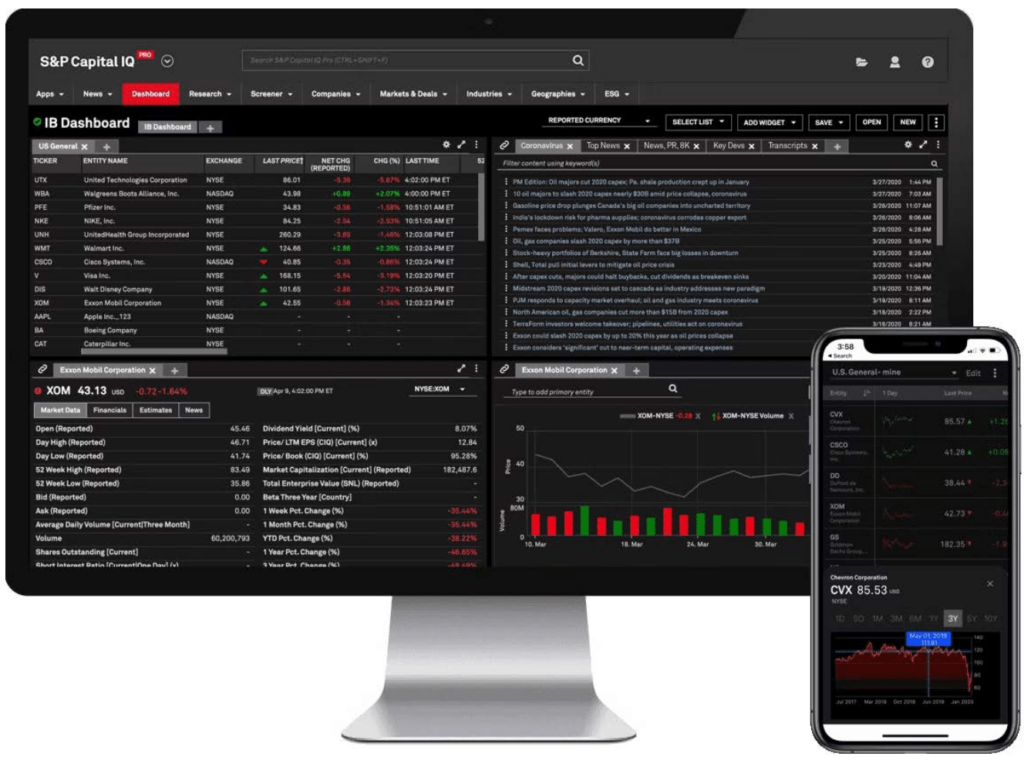
Source: S&P Global
Apparently, it also comes at a premium price point.
However, investment bankers, asset managers, and other financial professionals will love the platform’s unmatched financial data, company intelligence, and valuation tools.
It’s a great tool for tracking performance, identifying investment opportunities, and assessing risk.
If this sounds like something you could benefit from, head to their website to connect with their team and learn more about what Capital IQ Pro can do for you.
The last solution on our list is Xverum, a data provider offering access to:
What sets Xverum apart from other solutions in this article is its focus on talent sourcing, hiring, and retention.
Thanks to their extensive people datasets, you can access detailed professional information and career history, including:
—all in standardized, pre-processed formats.
This allows you to identify high-value candidates showing subtle job-seeking signals before they actively apply elsewhere.
Their job datasets are equally powerful.
You can track daily job posts from leading companies worldwide, receive instant alerts on new roles or changing requirements, and spot hiring patterns before anyone else does.
But it’s not just HR teams that benefit from this tool.
Xverum also provides company data, including firmographics, demographics, intent, and POI datasets that enable location-based decisions.
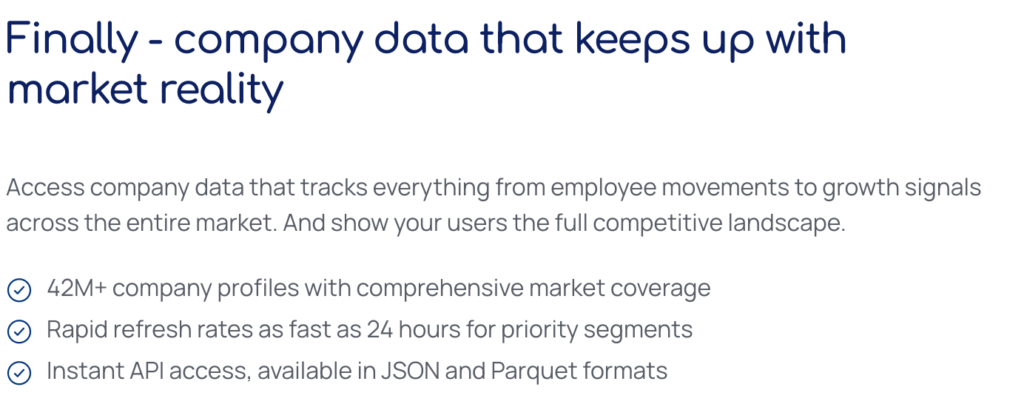
Source: Xverum
You can even set up custom alerts for any changes you care about, so you track what matters and ignore what doesn’t.
Your sales and marketing teams would love this!
That said, Xverum is less specialized for marketing and sales than tools like Dealfront, which is built specifically for those purposes.
Likewise, if you need sustainability insights, product intelligence, or risk assessment, platforms like Veridion or Capital IQ Pro may be a better fit.
In terms of data freshness, Xverum updates records monthly, which is slightly less frequent than the other tools.
However, they offer custom refresh cycles as fast as 24 hours if you need the latest information.
All data is fully GDPR and CCPA compliant as well.

Source: Xverum
Overall, Xverum is a strong choice for teams focused on talent sourcing, recruitment, and background checks, where marketing and sales data are secondary.
If this aligns with your needs, visit their website to connect with a data expert and learn more.
Choosing a business data partner isn’t about finding “the best” overall, but about finding the best fit for you.
Some tools are built for sales teams chasing leads, others for marketers running campaigns, and some for departments focused on compliance or supplier risk.
Your best move here is to kick the tires before you buy.
Take advantage of those free trials, request sample data, and see how it stacks up against what your team actually needs.
A quick trial run can reveal more than any sales pitch or online review.